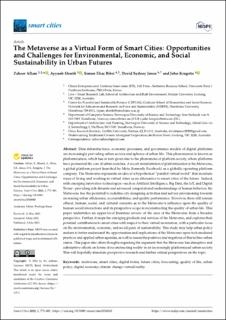| dc.description.abstract | Data infrastructures, economic processes, and governance models of digital platforms are increasingly pervading urban sectors and spheres of urban life. This phenomenon is known as platformization, which has in turn given rise to the phenomena of platform society, where platforms have permeated the core of urban societies. A recent manifestation of platformization is the Metaverse, a global platform project launched by Meta (formerly Facebook) as a globally operating platform company. The Metaverse represents an idea of a hypothetical “parallel virtual world” that incarnate ways of living and working in virtual cities as an alternative to smart cities of the future. Indeed, with emerging innovative technologies—such as Artificial Intelligence, Big Data, the IoT, and Digital Twins—providing rich datasets and advanced computational understandings of human behavior, the Metaverse has the potential to redefine city designing activities and service provisioning towards increasing urban efficiencies, accountabilities, and quality performance. However, there still remain ethical, human, social, and cultural concerns as to the Metaverse’s influence upon the quality of human social interactions and its prospective scope in reconstructing the quality of urban life. This paper undertakes an upper-level literature review of the area of the Metaverse from a broader perspective. Further, it maps the emerging products and services of the Metaverse, and explores their potential contributions to smart cities with respect to their virtual incarnation, with a particular focus on the environmental, economic, and social goals of sustainability. This study may help urban policy makers to better understand the opportunities and implications of the Metaverse upon tech-mediated practices and applied urban agendas, as well as assess the positives and negatives of this techno-urban vision. This paper also offers thoughts regarding the argument that the Metaverse has disruptive and substantive effects on forms of reconstructing reality in an increasingly platformized urban society. This will hopefully stimulate prospective research and further critical perspectives on the topic. | en_US |

